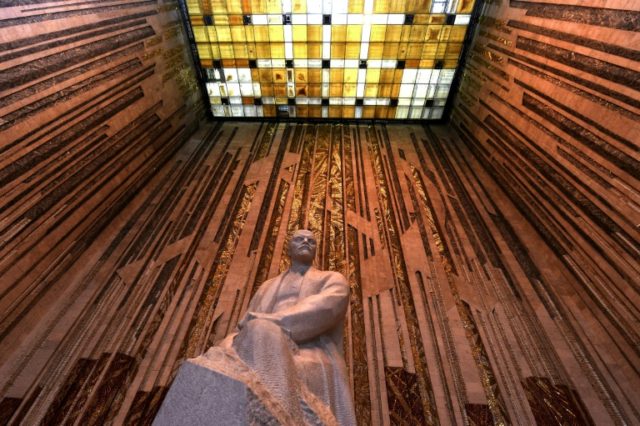Ulyanovsk (Russia) (AFP) – Crowds are sparse these days at the world’s biggest Lenin museum in the Russian city of Ulyanovsk, which has fences round it to protect visitors after several massive panels dropped off its facade.
A giant topiary sign still spells “Lenin” near the white stone box of the Lenin Memorial Museum on the bank of the Volga River, but the former Soviet leader’s home city is in search of a new identity 100 years after the October Revolution.
The city of Simbirsk 700 kilometres (440 miles) southeast of Moscow, where Lenin was born and lived until he was 17, was renamed Ulyanovsk in his honour after his death in 1924.
It became a mecca for tour groups of Lenin lovers from socialist countries.
To communists, Lenin is still the best thing to happen to Ulyanovsk, and local 68-year-old communist activist Yevgeny Lytyakov says the city owes its growth and status to the fact that Lenin was born there.
“Before the revolution, Simbirsk was a nondescript little town,” he said.
But Lenin no longer resonates in the same way and AFP journalists saw only a handful of visitors at the city’s showpiece museums.
“We call Ulyanovsk Lenin’s motherland, but all the same, the young generation has moved on,” admits Yelena Bespalova, head of research at the Lenin Motherland Reserve, the city’s second biggest Lenin museum.
– From idolised to demonised –
In the red-carpeted halls of the Lenin Memorial Museum, which covers some 4,000 square metres (43,000 square feet), exhibits range from Lenin’s death mask to a giant map of the Soviet Union that lights up glowing red.
Contemporary touches include a huge photograph of President Vladimir Putin, who visited in 2002.
“Today practically the biggest (Lenin) museum that is left is ours, in his motherland,” says former director Valery Perfilov, 70, who still works there.
The museum was once lavishly funded by the Communist Party and had around 5,000 visitors a day, but after the breakup of the USSR “it all suddenly collapsed,” he recalls.
“We were left without any funding.”
“If in the Soviet period, Lenin was idolised, deified, in the 1990s he was demonised.”
Today the museum is financed by the regional culture ministry and the current director Lidiya Larina says the complex, including a concert hall, has half a million visitors a year, but admits it is “outdated”.
It is due for a makeover ahead of Lenin’s 150th birthday in 2020 according to Larina, who wants to bring in interactive displays as well as a better shop and cafe.
The museum is also shifting its focus from Lenin as a political figure to his childhood in Ulyanovsk, Larina said, as Lenin’s role as an ideologue in the Soviet era is now generally downplayed by officials.
A plaque on Lenin’s former school calls him “Vladimir Ulyanov, the head of the government of Soviet Russia and the USSR from 1917 to 1923”.
“There’s a certain number of people in power who according to their views would happily raze the whole memory of the October Revolution and Lenin,” complains communist Lytyakov.
“But society won’t let this happen.”
The Lenin Motherland Reserve museum, which has federal funding, has a different aim — to immerse visitors in the atmosphere of Simbirsk in Lenin’s day.
It is an open-air museum of colourful painted wooden buildings in the neighbourhood where Lenin lived in various houses — his family moved constantly — including a fire station and a corner shop.
“The mission of our organisation is to preserve this corner of old Simbirsk,” says deputy development director Oksana Solovei.
The complex has more than 200,000 visitors a year, mostly locals, she says.
“Unfortunately we don’t have as many foreign tourists as in the Soviet period.”
The museum also gives a darker picture, with an exhibition on 1917 documenting looting and robberies by freed criminals and ex-soldiers.
“It was very dangerous even to walk on the streets. In 1917 the curfew started at 6 pm,” says Bespalova.
– ‘Alternative view’ –
The city markets its Lenin links as part of a “Red Circuit” for Chinese tourists to visit Soviet sites around Russia.
Museum staff said Chinese groups visit often, however AFP journalists did not see any Chinese tourists over two days.
The city is also looking to other famous natives, including 19th-century novelist Ivan Goncharov, and to possibly end Lenin’s domination over its image.
Two 26-year-old designers from Ulyanovsk have created a range of funky postcards, magnets and mugs presenting what they call an “alternative view” of the city.
One postcard has the slogan “Ulyanovsk — motherland of talents” and cartoons of 20 figures including Goncharov — but Lenin is conspicuously absent, and the women say this is no accident.
“We have nothing against him — Vladimir Ilyich,” said designer Nataliya Chebarkova.
“But it’s nice to tell people that Ulyanovsk isn’t just Lenin and the USSR.”

COMMENTS
Please let us know if you're having issues with commenting.